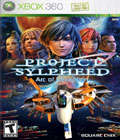Genre: Space Shooter
Publisher: Microsoft
Developer: Game Arts
Release Date: July 10, 2007
Everyone here has played a space shooter. With some creative thinking, one could even call Pong an epic battle between two ships that are passing around a meteor, but more intuitively, the genre's been around since the alien-blasting Space Invaders. All of the hallmarks of the genre are there: lots of things to shoot, you have to shoot slightly ahead of the targets, you have tactics (cover) to consider, and there's a goal. From there to the arcade classic Zaxxon, to the Super Nintendo hit StarFox, we eventually start to get out of the 2D plane, and then off the track to the free-roaming vein, sneaking in from PC hits such as the Star Wars game, X-Wing Vs. TIE Fighter.
Of course, the space epic then brought itself to consoles with the solid Rogue Squadron and, later in, the GameCube launch title Rogue Leader, allowing you to control ships and blow up all sorts of cool stuff. It is from this vein that Project Sylpheed: Arc of Deception feels most directly descended. You have the close friends on opposite sides of a war to set the narrative, the manic fights with lots of things to blow up, an empire versus a resistance — it's all here, and yet just different enough to not feel like a rip-off. It's here, more than anything else, that Project Sylpheed succeeds; it screams derivative, loud and proud, yet it does so with enough gusto, narrative, and just plain craziness to stand on its own and not be dependent on the Silpheed series' past success.
Project Sylpheed casts you as Katana Faraway, your generic far-too-skilled-for-his-age cadet in the Terra Central Armed Forces, prototyping your generic experimental new really powerful ship, the Delta Sabers. These Sabers are piloted by, among others, a token black guy who's extremely skilled, cute female who is probably a love interest, and guy who everyone cares about but gets shot down before the first level even starts. They're TCAF's front line against the ADAN Alliance, a group of star systems who have declared war on the "tyrannical" Terran government in response to an "accident" which destroyed one of their planets. Of course, they're out to seek payback against Earth, and you're one of TCAF's best hopes at stopping them. Oh, and by the way, your best-friend-turned-nemesis used to live on that destroyed planet and is now one of ADAN's top flying aces. It's funny how so many stereotypes that seem taken right out of the Gundam and Star Wars playbooks can actually end up feeling fresh when you recognize one of the things Project Sylpheed does right.
See, Project Sylpheed is broken up into a series of missions. While the order between them is essentially linear and the basic goals the same every time, every decision you make could affect your future missions. Save a carrier when protecting a base, and it might show up later on and make things a lot easier on you. Keep the refugee ships safe while they're evacuating, and you could get a bonus that beefs up your ship. Take down a squadron's aces, and that squadron won't be nearly as skillful the next time you fight them. As if to highlight this, every extra objective you attain will be neatly marked down at the mission's end. While you're not single-handedly defining the course of a war, you're dealing your fair share of damage, and your decisions feel like they have a measurable effect on the state of things.
All of the narrative branches in the world won't help a weak game base, but luckily, Project Sylpheed doesn't have to worry about that. An intelligent design, careful thinking, and full use of the Xbox 360's power makes this game's space combat feel more realistic in its pseudo-physics than most any game in the genre. Interstellar cruise missiles will fly at a base, and you'd better blow them up, but consider that where you shoot them will affect your odds of success, and there will be tons of fairly intelligent generic enemies and expert pilots shooting at you in the process, with all sorts of bullet trails flying around (which, in addition to looking nice, also serve as useful color indicators of who's who). If that weren't enough, the cute female is a decent pilot who follows your radio orders well, and you usually won't be fighting with only her by your side; besides one or two other Delta Sabers backing you up, there will often be weaker, albeit skillfully piloted, ships that can finish off a missile you weakened so you can focus on taking down some annoying enemy fighters.
Further, your ship's controls are pretty solid. While none of Square's three different schemes quite matches the intuitiveness that first-person shooters have attained using the two thumbsticks, they sort well by skill, do all the obvious things (triggers shoot, the button you're least likely to press does the function you'll use the least, etc.) in a reasonably intelligent fashion, and give you, if not a feel of perfect starfighter controls, at least a decent semblance of them. Drop into context, and you'll quickly catch onto the subtleties of your choice control scheme and the ship's overall rules, and start figuring out all sorts of ways to smash things.
To call Project Sylpheed's gameplay solid is an understatement. To say that graphics were secondary to gameplay is probably inaccurate, though, because Game Arts clearly went nuts on the graphics. This game is loaded with effects. The ships, individually, could probably be drawn on a PlayStation 2, but then you put a ton of them into play at once, throw in all sorts of visible bullet and engine trails, explosions with sonic booms, and it becomes nearly impossible to notice. The next generation is an incremental upgrade when you consider only graphical prowess (and without any Xbox Live integration besides Achievements, that's pretty much all Sylpheed has), but then you realize that it's an incremental upgrade in several areas all at once, and that one increment in just one area can make a major difference, and suddenly, this title's showing off just how far consoles have come.
The sound doesn't precisely suffer, either, with decent bang, solid voice acting, and a music set that sounds almost purely synthesized in nature and reminds me of Metal Gear Solid 2 more than anything else — only more upbeat. That's probably a good thing, since MGS2's soundtrack was quite impressive, and the synth-heavy, typically fast stylations set moods very effectively. Game Arts knew the mood they wanted to go for, and composed a soundtrack to match.
It's not as common as it should be for a game to clearly have a unified vision, but Project Sylpheed: Arc of Deception does exactly one thing, and does it well: hectic true-3D space combat that makes you feel like a Gundam pilot better than most Gundam games do. ("True 3D" means that there isn't usually a clear "below," though the game does define one as an anti-disorientation measure.) A few RPG elements here, and a fair bit of plot branching there, while still keeping a clear narrative, and finishing off with lots of polish combine to form one of the better games on the Xbox 360 — no, one of the better releases anywhere right now. Games like this can define the winner of a console race even if they don't end up being top-line successes, and as the PlayStation 3 and Wii's second holiday season (the 360's third) approaches, it's games like Project Sylpheed that will help define the Xbox 360 as a platform, even in the wake of titles like Halo 3.
Score: 8.5/10
More articles about Project Sylpheed











 Project Sylph is an HD remake of the popular 80s shooter franchise Silpheed.
Project Sylph is an HD remake of the popular 80s shooter franchise Silpheed.





















